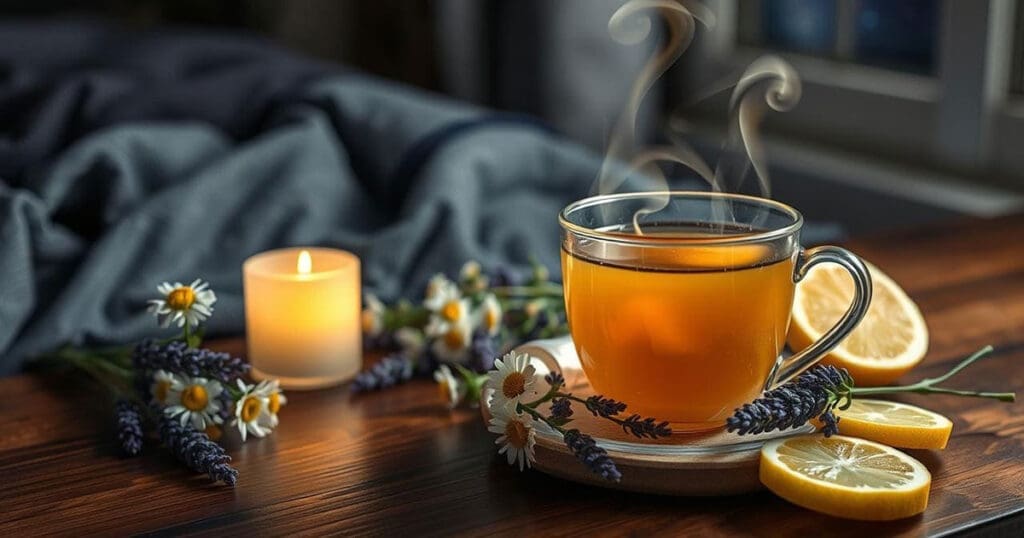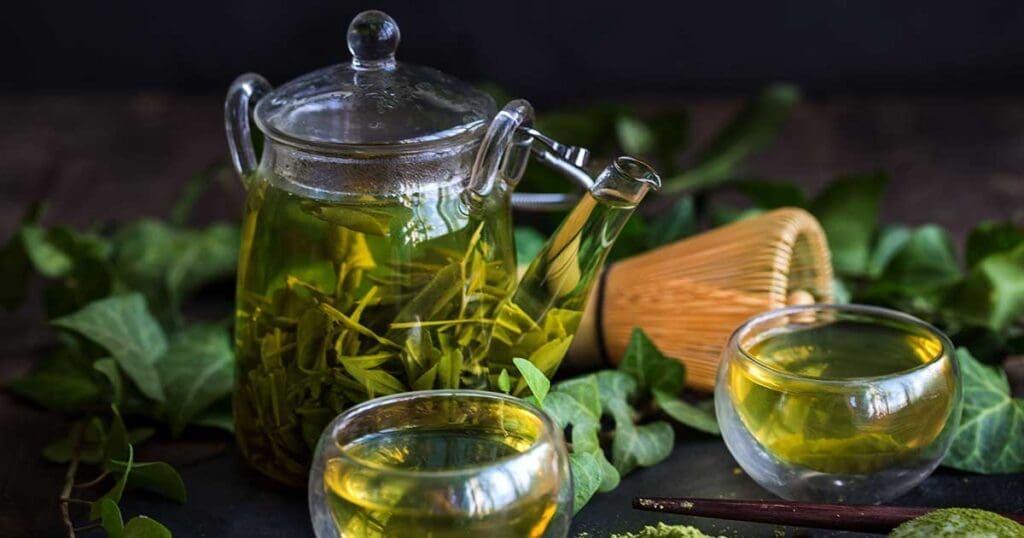We're excited to share our knowledge on The Best Teas for Better Sleep. These include herbal teas and bedtime teas that can help improve sleep quality. With so many options, it can be hard to choose the right tea for a restful night's sleep.
Research shows that certain teas can promote relaxation and improve sleep quality. They are a great addition to our bedtime routine. We'll explore the benefits of these teas and provide tips for creating a bedtime tea ritual.
By understanding the different types of sleep-promoting teas, we can make an informed decision. This includes herbal teas and bedtime teas. In this article, we'll dive into the world of The Best Teas for Better Sleep. We'll see how they can benefit our overall well-being.
Introduction to Better Sleep
As we explore sleep-promoting teas, we'll discuss the benefits of herbal teas and bedtime teas. They can help us achieve a restful night's sleep. Whether you're looking for a calming tea to unwind before bed or a soothing tea to help you relax, we've got you covered.
Key Takeaways
- We'll explore The Best Teas for Better Sleep, including herbal teas and bedtime teas.
- Research suggests that certain teas can promote relaxation and improve sleep quality.
- Understanding the different types of sleep-promoting teas can help us make an informed decision.
- Herbal teas and bedtime teas can be a great addition to our bedtime routine.
- We'll provide tips for creating a bedtime tea ritual to enhance our sleep experience.
- The Best Teas for Better Sleep can benefit our overall well-being.
Understanding the Connection Between Tea and Sleep
We've all had those nights when we can't sleep. Wondering how to fall asleep can be frustrating. But, some teas can really help. They can make you relax and sleep better.
Research shows that tea can change how we sleep. L-theanine in some teas lowers stress and makes us calm. Drinking tea can also start a bedtime routine, telling our body it's time to sleep.
How Tea Affects Your Sleep Cycle
Tea can change our sleep in different ways. Some teas have caffeine, which can keep us awake. But, herbal teas can calm us down. It's important to pick the right tea for a good night's sleep.
Teas like chamomile and lavender are great for bedtime. They help us relax and feel less anxious.
The Science Behind Sleep-Inducing Compounds
Science has found special compounds in tea that help us sleep. These compounds can lower inflammation and balance our hormones. Knowing about these compounds helps us choose the best teas for sleep.
Traditional Uses of Tea for Sleep
Tea has been used for sleep for centuries. It's a big part of bedtime in many cultures. It calms our minds and bodies before sleep.
There are many teas that can help us sleep better. Adding tea to our bedtime routine can make us feel refreshed in the morning.
The Best Teas for Better Sleep: Our Top Picks
We've found the top teas for relaxation and better sleep. These relaxing teas and nighttime teas are great for unwinding before bed. They help your body get ready for a good night's sleep.
Drinking relaxing teas and nighttime teas can reduce stress and anxiety. They also improve your mood and sleep quality. Here are some of our top picks for better sleep:
- Chamomile tea: known for its calming effects and ability to promote relaxation
- Lavender tea: recognized for its soothing properties and ability to reduce stress and anxiety
- Valerian root tea: a natural sedative that can help improve sleep quality
When picking a tea for sleep, think about what you like. Do you want something calming or energizing?
Drinking a cup of nighttime tea before bed can be a great way to unwind and prepare your body for a restful night's sleep.
| Tea | Benefits |
|---|---|
| Chamomile tea | Calming effects, promotes relaxation |
| Lavender tea | Soothing properties, reduces stress and anxiety |
| Valerian root tea | Natural sedative, improves sleep quality |
Chamomile: Nature's Sleep Solution
Herbal teas are great for unwinding, and chamomile is a top pick. It calms the mind and body, perfect for a good night's sleep. Chamomile is a standout among herbal teas for its soothing effects.
Getting your chamomile tea just right is key. Temperature and steeping time matter a lot. Use boiling water and steep for 5-7 minutes for the best flavor. For a stronger tea, steep for 10 minutes.
Benefits of Chamomile for Sleep
Chamomile tea is great for sleep. It helps by:
- Reducing stress and anxiety
- Promoting relaxation and calming the mind and body
- Improving sleep quality and duration
How to Prepare the Perfect Chamomile Tea
To enjoy chamomile tea fully, prepare it well. Here's how:
- Use one teaspoon of dried chamomile flowers per 8 oz of boiling water
- Steep the tea for 5-7 minutes, depending on desired strength
- Strain the tea and add honey or lemon to taste
Adding chamomile tea to your bedtime routine can help you relax and sleep better. It's a wonderful choice for your herbal tea collection.
Valerian Root Tea: The Natural Sedative
We've been looking into natural sleep remedies to better our sleep. Valerian root tea is one of them. It's been around for centuries to help relax and lower stress. This sleep-inducing tea is a favorite for those wanting a natural sleep fix.
Valerian root tea calms the mind and body. Drinking it warm before bed can lead to a good night's sleep. Its benefits include:
- Reduced anxiety and stress
- Improved sleep quality
- Increased relaxation
As we dive deeper into natural sleep remedies and sleep-inducing teas, valerian root tea stands out. Its calming effects and natural ingredients make it a top pick for centuries.

Adding valerian root tea to our bedtime routine can lead to better sleep. It's great for reducing stress or enhancing sleep quality. Valerian root tea is definitely a natural sleep remedy worth trying.
Lavender Tea: Aromatherapy in a Cup
Lavender tea is a top choice for unwinding after a long day. It's known for its soothing effects on the mind and body. This makes it perfect for relaxation and better sleep.
Lavender tea helps reduce stress and anxiety, ideal for a bedtime routine. Lavender's calming properties slow down a racing mind. It helps you relax and sleep better. Drink it 30 minutes before bed for the best results.
There are many ways to blend lavender with other teas. Popular choices include lavender and chamomile, or lavender and valerian root. These blends can make your tea even more calming. Here are some tips for blending:
- Start with a small amount of lavender and adjust to taste
- Choose teas that complement the flavor of lavender, such as floral or herbal teas
- Experiment with different ratios of lavender to other teas to find your perfect blend
Lavender's Calming Properties
Lavender is great for relaxation and reducing stress and anxiety. It's perfect for a calming tea before bed or during the day.
Best Blends with Lavender
Popular blends include lavender and chamomile, or lavender and valerian root. These blends enhance the calming effects and help you sleep better.
When to Drink Lavender Tea
Drink lavender tea about 30 minutes before bed. This allows the calming effects to work. It helps you sleep better and improves overall sleep quality.
Passionflower Tea: A Lesser-Known Sleep Aid
We've looked at many herbal teas that can help you sleep better. Now, let's talk about passionflower tea. It's a natural sleep remedy that's been around for centuries. It's great for calming your mind and body, perfect for before bed.
Passionflower tea is known for its relaxing effects. It can help reduce stress levels. Adding this tea to your bedtime routine can offer natural sleep benefits without harsh chemicals.
- Calming effects on the nervous system
- Promoting deep relaxation and reducing stress
- Improving sleep quality and duration
Exploring herbal teas and natural sleep remedies is important. Everyone's body is different. But passionflower tea has a long history and gentle effects, making it a good choice for sleep.
Next, we'll look at creating the perfect bedtime tea ritual. We'll cover the best timing, temperature, and steeping for your favorite teas.
Creating the Perfect Bedtime Tea Ritual
Exploring bedtime teas is key to a good night's sleep. A bedtime tea ritual tells our body it's time to rest. It can make us relax and sleep better. Try drinking teas like chamomile or valerian root 30 minutes to 1 hour before bed.
To make it even better, here are some tips:
- Choose a quiet and comfortable spot to enjoy your tea
- Use a soothing tea infuser or strainer to release the flavors and aromas
- Experiment with different temperatures and steeping times to find your perfect cup
Adding natural sweeteners like honey or stevia can make your tea taste better. The goal is to create a calm and cozy atmosphere. This helps your body get ready for a good night's sleep. By adding sleep-inducing teas to your bedtime routine, you can sleep better and wake up feeling great.
So, take a moment to unwind and enjoy a soothing cup of bedtime tea. Your body and mind will appreciate it.
| Tea Type | Steeping Time | Temperature |
|---|---|---|
| Chamomile | 5-7 minutes | 90-100°F |
| Valerian Root | 7-10 minutes | 95-105°F |
Common Mistakes to Avoid When Drinking Sleep Teas
We often overlook simple mistakes that can reduce the effectiveness of herbal teas in promoting better sleep. To get the most out of your sleep teas, it's essential to be aware of these common errors.
Some of the most common mistakes include drinking calming teas at the wrong time or using too much tea. To avoid these mistakes, consider the following tips:
- Drink your sleep tea at least 30 minutes before bedtime to allow the ingredients to take effect.
- Use the recommended amount of tea leaves or herbs to avoid over-stimulating your body.
- Combine your sleep tea with a relaxing bedtime routine, such as reading a book or taking a warm bath, to enhance its effectiveness.
By being mindful of these common mistakes and taking steps to avoid them, you can maximize the benefits of your herbal teas and improve the quality of your sleep. Remember to always choose high-quality calming teas and follow the recommended guidelines for preparation and consumption.

With a little practice and patience, you can develop a sleep tea routine that works for you and helps you achieve a restful and rejuvenating sleep.
| Tea Type | Recommended Dosage | Best Time to Drink |
|---|---|---|
| Chamomile | 1-2 teaspoons per cup | 30 minutes before bedtime |
| Lavender | 1 teaspoon per cup | 1 hour before bedtime |
| Valerian Root | 1-2 teaspoons per cup | 30 minutes before bedtime |
Combining Different Teas for Maximum Effect
Combining different teas can make them even better for sleep. Mixing sleep-inducing teas creates a strong natural sleep remedy. This way, we can make our tea blends fit our personal needs for a good night's sleep.
Safe Tea Combinations
When mixing teas, picking safe combinations is key. Teas like chamomile and lavender work well together. But, others might not. Start with a base tea like chamomile, then add a bit of valerian root or passionflower for a special blend.
Potency and Dosage Tips
To get the best from our teas, we must think about their strength and how much to drink. Start with a small amount and adjust as needed. Also, try different steeping times and temperatures to find what works best for you.
Some great tea mixes include:
- Chamomile and lavender for a calming and relaxing blend
- Valerian root and passionflower for a potent sleep-promoting blend
- Lavender and lemon balm for a soothing and uplifting blend
By trying out different tea mixes and strengths, we can make a sleep remedy that's just right for us. Always choose safe tea combinations and adjust your amount to get a restful and refreshing sleep.
Safety Considerations and Potential Side Effects
It's important to think about safety when drinking herbal teas, like calming ones. We want to make sure you can enjoy these teas safely. This means avoiding any bad effects.
Some herbal teas might not mix well with medicines or could cause side effects if you drink too much. For example, some teas might not be good with blood thinners or diabetes meds. Always talk to a doctor before trying new teas, if you're on meds or have health issues.
Interactions with Medications
Teas with valerian root or passionflower might not get along with sedatives or antidepressants. Knowing this can help you stay safe. Always check with a doctor to make sure it's okay.
Who Should Avoid Sleep Teas
Pregnant or nursing women should be careful with sleep teas. Some herbs might not be good for the baby or could affect milk. Also, people with high blood pressure or kidney disease should talk to their doctor before drinking sleep teas.
- Consult with a healthcare professional before consuming any new teas, if you're on meds or have health issues.
- Start with small amounts and watch how your body reacts to the tea.
- Choose teas from trusted sources to avoid bad stuff.
Knowing about these safety tips can help you enjoy herbal teas safely. This includes calming teas, without worrying about risks.
| Herbal Tea | Potential Interaction | Precautions |
|---|---|---|
| Valerian root tea | Sedatives or antidepressants | Consult with a healthcare professional |
| Passionflower tea | Sedatives or antidepressants | Consult with a healthcare professional |
| Chamomile tea | None known | None |
Where to Find Quality Sleep-Promoting Teas
Finding quality sleep-promoting teas can be tough, but there are many options. Health food stores are a good starting point for natural sleep remedies. They offer a variety of sleep-inducing teas from different brands.
Online is another place to find great sleep teas. Many online shops focus on natural sleep remedies. Make sure to read reviews and check ingredients for quality.
- Health food stores
- Online retailers specializing in natural health products
- Specialty tea shops
Exploring these options can help you find the best natural sleep remedies for a good night's sleep.
Remember, a good night's sleep is key for health and well-being. Adding sleep-inducing teas to your bedtime routine can make you feel refreshed and ready for the day.
Conclusion: Making Tea Part of Your Sleep Routine
Incorporating high-quality bedtime teas into your routine can greatly improve sleep quality. Ingredients like chamomile, valerian root, and lavender have natural sleep-promoting properties. They help create a soothing ritual that prepares you for a good night's sleep.
Whether you like chamomile or passionflower tea, finding the right one is key. Try different teas, pay attention to how and when you drink them. If you have concerns, talk to a healthcare professional.
Tea can make your bedtime routine more enjoyable. It can help you wake up feeling refreshed and ready for the day. So, why not enjoy a warm cup of your favorite tea and let nature guide you to sleep?
Disclaimer:
Some of the links on this site are affiliate links, which means I may earn a small commission if you make a purchase through them, at no additional cost to you. Thank you for supporting Brew Sip Repeat!




Facebook Comments